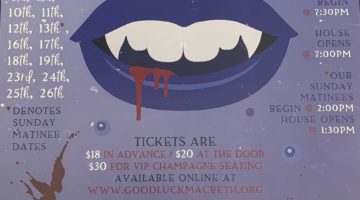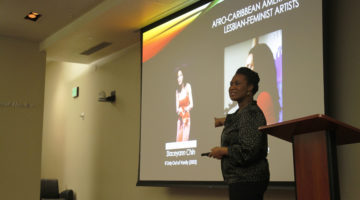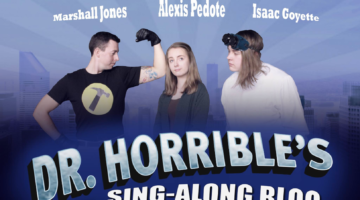
Courtesy of Ann Archbold. The cast of Urinetown sings to the audience — Photos courtesy of Ann Archbold
The cast of Urinetown gathers for a musical number on Friday, Mar. 1. The play focuses on the taxation of urination, and serves as a comedic reflection of society’s extortion practices.
A warning, a sign, or a prediction of our demise? Last Friday, Mar. 1, the Redfield Studio Theatre at the University of Nevada, Reno, presented Urinetown. Set in the near future after a 20-year drought, the comedy revolves around one law that strictly prohibits free urination. When the only amenities company decides to raise the fee, the poor reacts in revolt. The comedic satire, directed by Gavin Mayer, had audiences questioning whether we live in a place that protects our rights or makes a fortune out of them.
During the opening act, Officer Lockstock, played by Thomas Chubb, greets the audience and narrates the play’s prologue, as he gestures with flashy jazz hands and charms with a sales pitch voice. He warns audience members that the musical does not have a happy ending, and the audience will not know what Urinetown is until the second act. As the show goes on, so does the effortless exchange between moral tensions and comedic relief.
Out of all the different utilizations water has in a society, putting a price on urination seemed to be the most sensible. Privatizing a human necessity like urination made one man particularly rich. Caldwell B. Caldwell, played by Adriano Cabral, epitomized the greed nurtured by capitalism and supported by the legislature. As a result, the poor would anxiously count their pennies to use the amenities. For those who did not have the means to relieve themselves legally, they were left without any other choice but to urinate openly and be banished to Urinetown.
The idea that urination was no longer a right, rather a commodity, mirrors the ethical dilemmas U.S. society currently faces. Little Sally, played by Adelynn Tourondel, questioned the reason behind the play’s subject matter to Officer Lockstock. She thought the play should also cover topics such as hydraulics, irrigation or even laundry, which were also affected by the drought. Lockstock replied that focusing on one issue was for the audience’s sake, as to not overwhelm them with too many topics. She refuted by saying the play should have instead been about how the town managed its hydraulics since the drought. Throughout the play, Little Sally acted as the play’s conscience and complemented Lockstock’s narrator role.
While the subject does become more difficult to accept, the play lightens the mood with music, song, and dance. The jazz melodies played by the ensemble captured the emotional tone of the play. The playful yet passionate sounds highlighted the absurdity of Penelope Pennywise’s (played by Abby Rosen) song on the privilege to pee, as well as the cops’ sadistic thrill of hunting for public urinators, or the exasperation of the poor when they decided to snuff Hope Caldwell, played by Natalie Gonzalez. The choreography for each song, arranged by Nate Hodges, added to the themes of the musical. The exaggerated dance moves in some of the numbers revealed each character’s caricature-like qualities, thus openly exposing the legalized extortion of putting a price on going to the bathroom.
The play also portrayed heroes, of sorts, who try to free the poor from becoming criminals for public urination. Bobby Strong, played by Wesley Adam Wamsley, is repeatedly told to keep his head out of the clouds to dissuade him from questioning the status quo. Hope Caldwell believed that love and happiness should be the compasses that lead the town to a better tomorrow. She is warned that her pure heart is too naïve to understand the importance of the privatization of urination. At the end of the play, the audience discovered that neither side had executed the best solution.
The play will continue to run from Tuesday, March 5 to Saturday, March 9 in the Redfield Proscenium Theatre in the Church Fine Arts building. For more information and ticket prices, please go to mynevadatickets.com, unr.edu/theatre-dance, or call 775-784-444. There are a limited number of $5 tickets for students that show their student ID.
Sara Gallego can be reached at csuggs@nevadasagebrush.unr.edu, or on Twitter @NevadaSagebrush.












